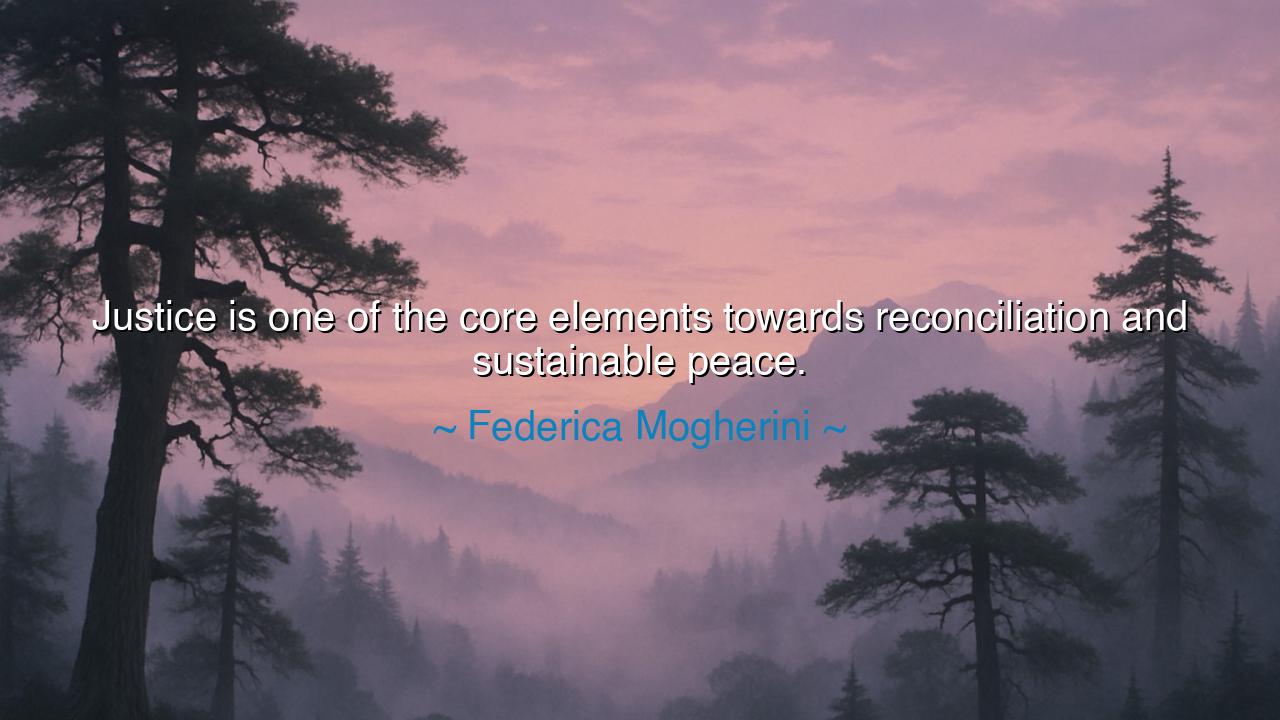
Justice is one of the core elements towards reconciliation and






Hear, O children of the future, the words of Federica Mogherini, spoken as if from the lips of the ancients: “Justice is one of the core elements towards reconciliation and sustainable peace.” This is no idle statement, but a truth woven into the very fabric of history. For peace without justice is a fragile illusion, like a house built upon sand, destined to collapse with the first storm. But when justice stands firm as a foundation, reconciliation becomes possible, and from reconciliation flows the enduring river of peace.
The origin of these words lies in the lessons of a broken world. Mogherini, who served as a voice for Europe in times of division, saw that treaties and agreements are but parchment unless they rest upon justice. For if wounds are ignored and crimes left unaddressed, bitterness festers like poison in the heart of nations. Justice, then, is the healer’s hand, cleansing the wound so that it may close. Without it, reconciliation is false; with it, peace may endure across generations.
The ancients themselves proclaimed this wisdom. Did not Aristotle say that justice is the bond of human society, the principle that keeps men from preying upon each other like beasts? And in the Scriptures, the prophets declared that peace and justice walk hand in hand: “Justice shall roll down like waters, and righteousness like an ever-flowing stream.” To seek peace without justice is to plant seeds upon barren soil. Only when fairness and truth take root can reconciliation bear fruit.
Consider the tale of South Africa, torn for decades by the cruelty of apartheid. When that system fell, the nation might have descended into vengeance and endless bloodshed. Yet the leaders, guided by wisdom, established the Truth and Reconciliation Commission. There, the crimes of the past were named, the victims honored, the guilty called to account. Though imperfect, this pursuit of justice allowed reconciliation to take root. By acknowledging wrongs and seeking to right them, the nation avoided the fate of many others who, ignoring justice, fell back into cycles of war.
But history also shows the ruin that comes when justice is denied. After the First World War, the victors imposed harsh penalties upon Germany without true reconciliation, sowing seeds of resentment that would later ignite into a greater and more terrible war. Peace was declared, but it was not sustainable peace, for justice was absent. From this, we learn that peace is not the mere silence of guns, but the harmony of hearts made whole through fairness, accountability, and truth.
The lesson for us is clear: if we would be peacemakers, we must also be seekers of justice. In our nations, in our communities, in our families, reconciliation can only grow where fairness is present. To overlook wrongs for the sake of a quick peace is to invite future conflict. But to face wrongs honestly, to hold the guilty accountable, and to restore dignity to the wounded—this is the path of lasting peace. Justice is the soil, reconciliation the seed, and sustainable peace the harvest.
Practical actions flow from this teaching. Let leaders ensure that the laws protect both the strong and the weak. Let communities remember their wounds, not to dwell in anger, but to seek healing through truth. Let individuals practice justice in their daily lives—being fair in dealings, honest in speech, merciful to the oppressed. For just as nations fall when justice fails, so too does every household and every bond between friends. By living justly, we build peace not only for ourselves, but for the generations that follow.
So remember the words of Mogherini: justice is the cornerstone, reconciliation the builder, and sustainable peace the temple that rises from their union. Guard this truth, O seeker, and pass it on, for only through justice can mankind end the cycles of violence and dwell together in harmony beneath the heavens.






GDGold D.dragon
Mogherini’s statement is thought-provoking, but it raises a tough question—how do we ensure that justice doesn’t become a tool for division rather than unity? In some cases, the pursuit of justice can deepen conflict, especially if it feels one-sided or incomplete. Is it possible for justice to truly foster reconciliation, or is there always the risk that it will perpetuate existing tensions?
LLoc
This quote seems to suggest that justice is more than just the legal process—it’s about healing communities and creating sustainable peace. But in practice, is justice always enough? How do we ensure that justice leads to true reconciliation, rather than further division? In cases of deep societal trauma or conflict, can justice alone truly bring lasting peace, or is a broader approach necessary?
PUNguyen phuong uyen
I agree with the idea that justice is fundamental to reconciliation, but it makes me question how we define justice in different contexts. Does justice always mean punishment, or can it sometimes mean healing and restorative actions? How do we find the balance between holding people accountable and creating an environment for lasting peace? What happens when justice for one group contradicts the peace for another?
TTNguyen Thi Thu
Federica Mogherini’s quote really resonates with me, especially in today’s world where justice often seems elusive. Justice is such a key part of the healing process, but can we really have reconciliation without it? In some cases, is justice always served, or are there situations where true peace can only come by forgiving past wrongs? I wonder if we can always achieve sustainable peace without fully addressing past injustices.